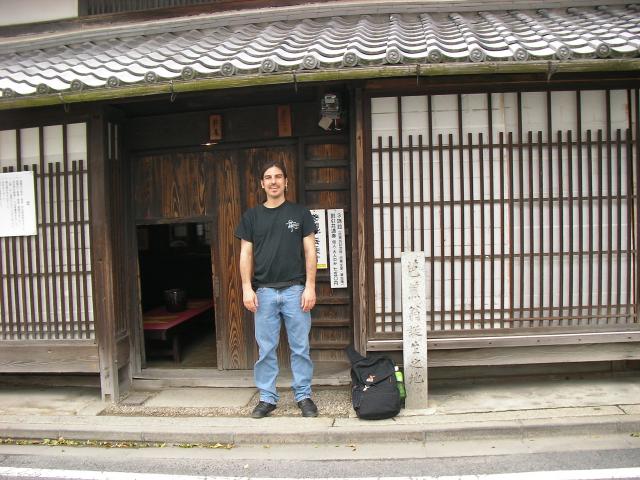
finger wet with tears
i touch the monument to
haiku poets
-- written at Rakushisha, Kyoto
A poetic pilgrimage today. Back out to Arishiyama, this time with the intent to visit Rakushisha, the reconstructed cottage of haiku poet Mukai Kyorai. Kyorai was a friend and student of Basho, who said of Kyorai that he was "in charge of haiku in Western Japan."
Some of his haiku (gathered from the internet):
Chanting and humming / gongs immerse the green valley / in cool waves of air
Returning from a funeral / I saw this very moon / high above the moor
Awakening faith / At the time when blossoms / Are just in the bud.
Sadly fading / its light on my palm - / a glowworm
Trees as well as stones / glaring in my sight - / heat wave
I'm coming, I yelled / yet knocking on the gate - / it's snowing
Rakushisha literally means "Cottage of the Fallen Persimmons". Apparently, Kyorai had a bunch of fruit trees with a bumper crop expected, and had made arrangements to sell it. But a storm blew up one night, and knocked all the persimmons to the ground. (Arishiyama means "stormy mountain".)
When Kyorai saw the damage the next day, and saw the mountain through the now-bare trees, he had an awakening experience (even if an expensive one, since he had to pay back advance payment on the fruit.)
Basho stayed at the cottage three times, in the late 1600s. So the place has some gravitas in the haiku world.
So much so, I found (and this wasn't in the guidebook) that there's a monument to haiku poets in the garden. This "haijin to" (haiku poets memorial) gorinto (five-stone monument, a traditional form often found in graveyards representing the five elements - in Japanese thinking, earth, water, fire, wind, and heaven/void) is dedicated to all haiku poets of the past, present, and future.
Well, having written a few haiku myself, I figure that's a monument to us, not a monument to them, if you see my meaning, so I got a little teary-eyed. Touched my eye, then touched the stone, finger damp with a tear.
A poem stone next to the monument (added later, I think) reads:
the spring rain
heaven and earth here
the monument to haiku poets
haru no ame
ame tsuchi koko ni
haijin to
